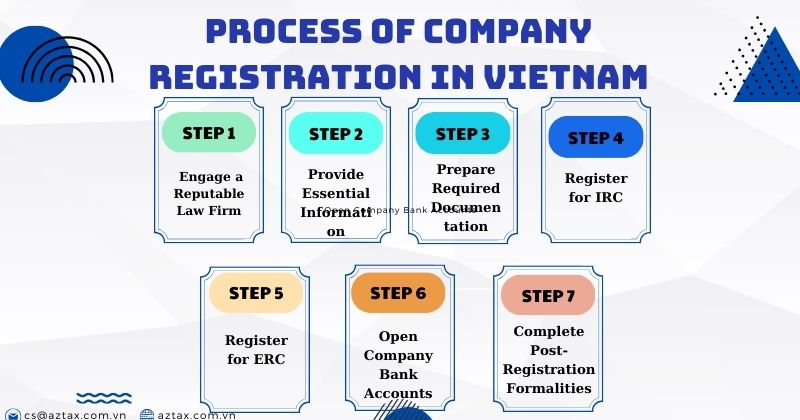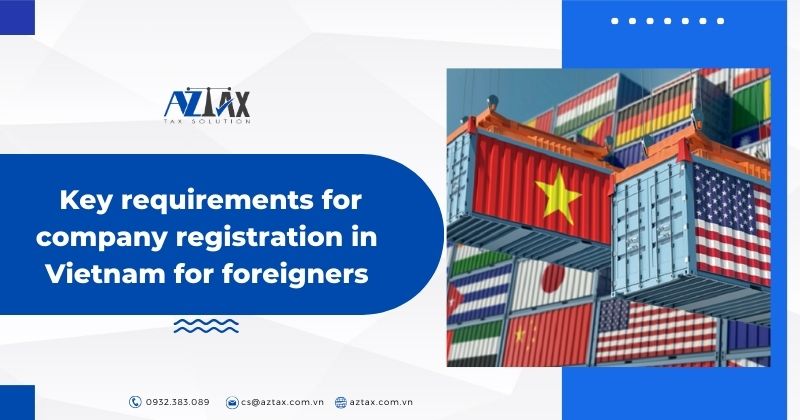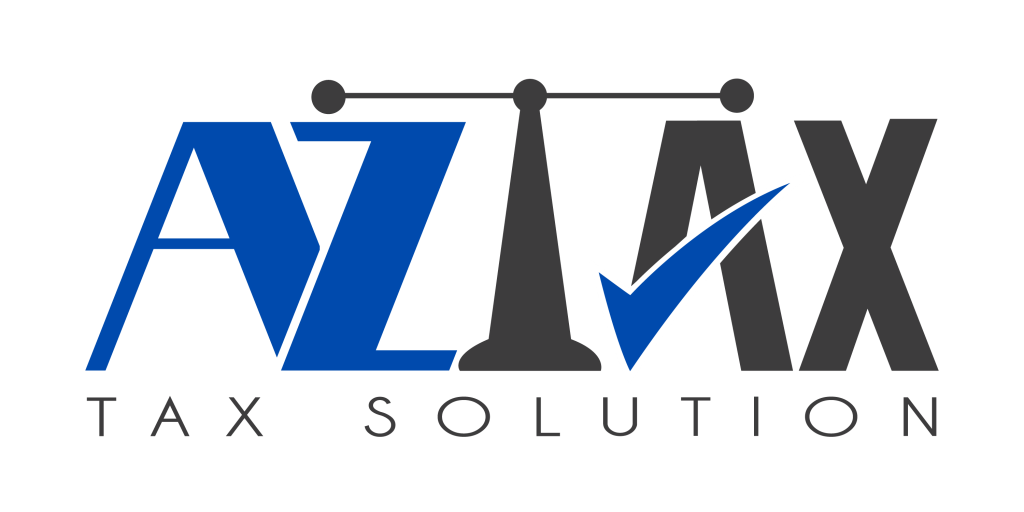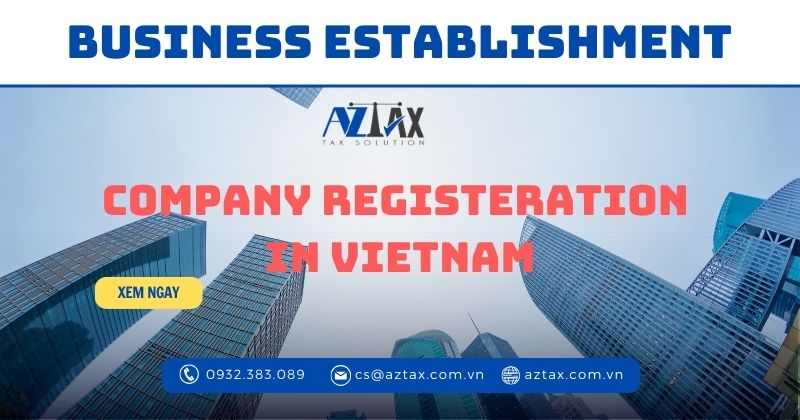Vietnam company registration is of interest to many foreign investors. Vietnam, with its vibrant economy and strategic location, has become an enticing destination for entrepreneurs looking to expand their horizons. In this article, AZTAX will guide you through the intricacies of Vietnam company registration, providing valuable insights and practical tips for a seamless process. Let’s explore this article with AZTAX.
1. Process for Vietnam company registration
The process of establishing a company in Vietnam involves various steps, and foreign investors must navigate through all procedures and documentation before commencing operations. To streamline the Vietnam company registration process, AZTAX provides a concise summary with the following 7 steps.

Step 1: Engage a reputable law firm
Vietnam company registration can be challenging for foreigners, but partnering with a local law firm like Nova Law can streamline the process. Leveraging their expert knowledge in Vietnam business registration, these professionals offer precise solutions for establishing a new company, ultimately saving valuable time and resources.
Step 2: Provide essential information:
Upon engagement, the law firm will request vital information from investors, including investor details, preferred company name, intended business activities, declared investment capital, and labor requirements. This data is essential for advising and preparing comprehensive application dossiers in compliance with legal requirements.
Step 3: Prepare the required documentation:
Following your lawyer’s guidance, the next step involves compiling all necessary documents for the company’s establishment. Your lawyer will handle the preparation of application forms, requiring your signature and/or stamp for validation.
Step 4 : Register for an Investment Registration Certificate (IRC):
This step is crucial for foreign-owned companies, irrespective of having a Vietnamese partner. The Investment Registrar typically reviews and approves small-scale investment project applications within an estimated timeline of 15 working days, resulting in the issuance of an Investment Registration Certificate.
Step 5: Register for an Enterprise Registration Certificate (ERC):
After obtaining the IRC, investors must register a company in Vietnam with the Business Registration Office, with an estimated timeline of 5 working days. The outcome includes the Enterprise Registration Certificate in Vietnam, a company seal, and a tax code, officially establishing your company for business in Vietnam.
Step 6: Open Company Bank Accounts:
A foreign-owned company needs at least two bank accounts:
- Direct Investment Capital Account for investment-related transactions.
- Current Account in VND for daily business activities.
Step 7: Complete Post-Registration Formalities:
Beyond company registration process, additional post-registration formalities include purchasing a USB token for a digital signature, displaying a company signboard at the headquarters, registering initial tax with the tax authority, submitting periodic reports, optional registration for a customs code and trademark, and contributing the full registered charter capital within 90 days from ERC issuance.
Lawyers continue to play a crucial role in handling legal compliance, addressing labor law issues, and applying for any additional licenses or permits as needed.
2. What information and documents for company registration process in Vietnam?
The preferred corporate structure for foreign-owned startups in Vietnam is a foreign-owned Limited Liability Company (LLC). Establishing this type of company involves a two-stage process. First, you must obtain approval from the Department of Planning and Investment, typically in the form of an Investment Registration Certificate (IRC), for your project in Vietnam. Subsequently, you’ll need an Enterprise Registration Certificate (ERC) to officially create your company. While the official timeline for these stages is around 30 days, thorough preparation is crucial.

Information that needs to be prepared for business registration in Vietnam:
- Clearly define your business lines and scope.
- Verify your capital and proposed scale.
- Secure your company address.
- Confirm your ownership and management structure.
Required Documents to establish a company in Vietnam:
For corporate investors:
- Certificate of incorporation (authenticated copy) or certificate of business registration or equivalent documents.
- Latest audited financial report (authenticated copy).
- Legalized copies of passports from directors and shareholders.
For individual investors:
- Latest bank statement (authenticated copy).
- Legalized copies of passports from directors.
For the proposed registered address (residential/commercial):
- Rent agreement from owner/landlord.
3. Key requirements for Vietnam company registration for foreigners
For a company established in Vietnam, ongoing corporate compliance requirements of law in Vietnam are essential.

Below are some conditions for establishing a business in Vietnam that foreign investors should pay attention to:
- Minimum Capital Requirements: Vietnam generally does not impose minimum capital requirements, but registered capital is assessed by the Department of Planning and Investment to cover initial business expenses. Some sectors may have specific requirements.
- Charter Capital and Total Investment Capital: Charter Capital, reflecting owner contributions, and Total Investment Capital, combining charter capital and loans, require registration. Adjustments are possible with local authority approval.
- Capital Contribution Schedules: Investors must contribute capital within 90 days of Foreign Invested Enterprise (FIE) establishment, unless otherwise approved.
- Transferring Capital to FIE: Foreign investors must open a capital bank account in Vietnam for fund transfers, facilitating in-country transactions.
- Company Registered Address: A legal address in Vietnam is vital. Physical locations are standard, while service-based businesses may use a virtual office. The Department of Planning and Investment may verify chosen business addresses during incorporation.
- Company Legal Representative: At least one Legal Representative (LR), such as the Company President or Director, is mandatory. LR requires a Vietnamese residential address, with residency preferred but not mandatory during incorporation.
- Accounting and Tax Compliance: Adhering to accounting and tax regulations involves regular reporting, covering corporate income tax, value-added tax, and personal income tax according to Vietnam’s standards. Ad-hoc or periodic filings may be required.
- Annual Audit Compliance: LLCs and Representative offices must submit annual audit reports in line with Vietnam’s finalization calendar. Representative offices have less stringent requirements.
- Employment Compliance: Hiring complies with Vietnam’s HR laws, encompassing restrictions on employee types, work permits for foreign employees, and social insurance payments as part of payroll.
- Business License Tax and Special License Compliance: Companies must make annual business license tax payments starting in the second year. Compliance and renewals are required for specific business licenses.
- Foreign Investment Report Compliance: Quarterly, semi-annual, and annual foreign investment reports, covering investment implementation and supervision, are mandatory.
4. An overview of the types of company structures
In accordance with the 2020 Enterprise Law, Vietnam recognizes five types of legal businesses: private enterprises, limited companies, joint stock companies, partnerships, and state-owned enterprises.

Each type carries its own set of advantages and disadvantages, necessitating careful consideration by company owners for informed decision-making aligned with their needs and future development goals.
Private Enterprises
Private Enterprises, solely owned by an individual, operate under the owner’s complete responsibility for all business activities, risking their entire assets. While they enjoy straightforward organizational structures and management, these enterprises lack legal status, exposing owners to high risks due to unlimited liability for debts and financial obligations.
Limited Liability Company (LLC)
Single-member LLC
Single-member LLC, owned by an individual or organization, offers limited liability to the extent of the company’s charter capital. It enjoys legal status, can issue bonds, but cannot issue shares. The owner must contribute assets within 90 days of establishment, with failure requiring charter capital adjustment.
Advantages:
- Low risk for the owner.
- Simple management structure.
- Right to issue bonds.
Disadvantages:
- Limited capital raising due to a single owner.
- Owner’s expenses are not considered as company expenses.
LLC with Two or More Members
A limited liability company with multiple members, ranging from 2 to 50, provides legal status and limited liability for members. Capital contribution must occur within 90 days, with provisions for adjustments if not fulfilled. It cannot issue shares but has the right to issue bonds.
Advantages:
- Limited liability for members.
- Simple management with trusted partners.
- Capital transfer control.
Disadvantages:
- Stricter management compared to other models.
- Limited capital raising without issuing shares.
Vietnam company incorporation
Vietnam company incorporation, defined by the 2020 Enterprise Law, divides charter capital into shares. It has legal status and a structured management hierarchy. Shareholders, whether individuals or organizations, enjoy limited liability. The company must have a minimum of 3 shareholders, and there’s no maximum limit.
Advantages:
- Low risk for shareholders.
- High capital-raising ability through share issuance.
- Operational independence.
Disadvantages:
- Complex structure with numerous shareholders.
- Challenges in decision-making and internal disputes.
- Required disclosure of financial plans.
Partnership Company
A partnership company requires at least two general partners and may include capital-contributing partners. It cannot issue securities to raise capital but gain legal status upon obtaining the Enterprise Registration Certificate.
Advantages:
- Utilize the personal reputation of multiple individuals.
- Relatively simple management with mutual trust.
Disadvantages:
- High risk to general partners due to unlimited liability.
- Limited rights to capital-contributing partners.
- Inability to issue shares or bonds.
State-Owned Enterprise
State-owned enterprises, wholly or partially owned by the state, operate in key industries with strict management and a rigorous operating structure.
5. Conclusion
The process of forming a Vietnamese company demands a nuanced blend of legal expertise, cultural acumen, and strategic vision. Securing the necessary approvals and aligning with local business practices necessitate meticulous planning and a proactive stance. The journey becomes more seamless with the engagement of professional assistance and tapping into local expertise, proving instrumental in ensuring a smooth establishment process.
As the Vietnamese market dynamically evolves, continually presenting novel opportunities, establishing a company within this vibrant landscape not only solidifies a legal presence but also positions businesses to thrive in a region characterized by perpetual growth and innovation.
With the insights provided, foreign investors can hopefully navigate the intricacies of Vietnam company registration more adeptly. For further clarification or assistance, don’t hesitate to reach out to AZTAX through the contact details below to have free company formation consultants. Our dedicated team stands ready to offer comprehensive support by addressing any inquiries you may have regarding the incorporation of a company in Vietnam.
6. FAQ
Typically, the comprehensive procedure takes an estimated 15 working days from the time you submit your IRC application. However, if your documentation is incomplete, necessitating additional review by other authorities, the timeframe may extend to approximately 30 days. Rest assured, ensuring the completeness of your dossier and swift collaboration can expedite the overall process.
Once you’ve submitted your application for the Enterprise Registration Certificate, you can anticipate feedback on approval within the legally mandated period of three working days. However, it’s important to note that the actual duration might extend beyond this timeframe. In cases where the submitted dossier falls short of requirements, amendments or supplements may be necessary. In the event of a complete rejection, applicants will be promptly informed, receiving a transparent explanation for their disapproval.
They must have a valid residential address in Vietnam, reside in the country for at least six months a year, and not leave the country for more than three months at a time.
Every company in Vietnam must have a designated fixed place of business, known as the registered address, for both initial registration and continued compliance. While using a private house may be permissible for company registration, subject to the nature of the business and its purpose, it’s important to note that apartments are not eligible for this purpose.
In Vietnam, there are many law firms that can assist you to set up company in Vietnam, but not all of them are reputable, ensuring quality in terms of time and validity. However, collaborating with a reputable local legal firm such as AZTAX can significantly simplify the process. Drawing upon their specialized expertise in Vietnamese business registration, these professionals provide accurate solutions for the establishment of a new company, ultimately preserving valuable time and resources.
Foreign investors can submit their documents to the Department of Planning and Investment either in person or online through the National Information Portal for Business Registration. The Department of Planning and Investment will then review the validity and issue the Certificate of Business Registration.












